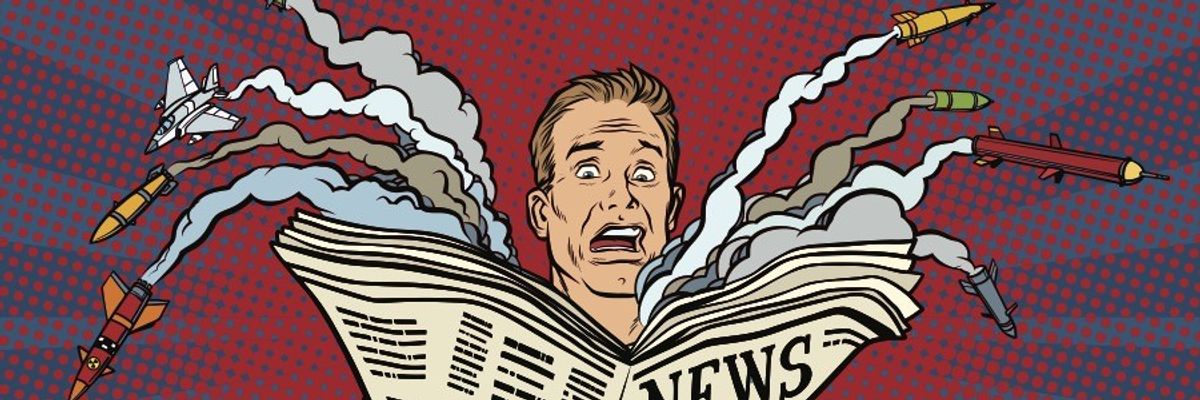If you ever wondered why Americans have an extremely irrational fear of Iran, two recent articles from Politico can provide a good answer.
On Saturday evening over the Memorial Day weekend, Politico published what it purported to be an “exclusive” — “U.S. monitoring Iranian warships that may be headed to Venezuela,” the headline read, with the two opening graphs as follows:
The U.S. national security community is monitoring two Iranian naval vessels whose ultimate destination may be Venezuela, according to three people familiar with the situation, in what would be a provocative move at a tense moment in U.S.-Iran relations.
An Iranian frigate and the Makran, a former oil tanker that was converted to a floating forward staging base, have been heading south along the east coast of Africa, said the people, who spoke on condition of anonymity to discuss a sensitive subject.
So two Iranian boats are in the Indian Ocean and they might be going to Venezuela? Oh, and even if they were headed to the South American country, no one knows why. “Iran’s intent in sending the vessels in the direction of the Western Hemisphere remains a mystery,” Politico reported.
Politico continued: “The mere presence of Iranian warships in America’s backyard would represent a challenge to U.S. authority in the region.” Really? How?
Indeed, the Atlantic Council’s Emma Ashford pointed out at least one substantive issue with that particular line.
“So now we approve of spheres of influence?” she wondered on Twitter, adding, “The biggest problem with America's stance against spheres of influence for China and Russia is that we tacitly accept them elsewhere, notably in our own backyard. The hypocrisy matters [because] it leaves other states unsure of our red lines.”
Aside from that, here’s an actual photo of the Makran, one of the ships in question, which supposedly poses this dire threat:
So as you can see, the “warship” descriptor from Politico is really quite generous. And it’s not exactly clear what kind of threat this former oil tanker represents, particularly when matched up against the power of the U.S. Navy, Marines, Air Force, and Coast Guard.
But later, about half way down the piece, we get to the heart of the matter, or why Politico is hyping this non-event. The Iranian ships’ presence in the United States’ backyard (if that’s what’s indeed happening, because remember we still don’t even know where these ships are going), the article says, “would likely inflame the debate in Washington over President Joe Biden’s decision to re-open negotiations with Tehran.”
And that’s exactly what this article is meant to do. Politico knows that the slightest whiff of nefarious Iranian activity, hyped or otherwise, will turn Washington hawks up to 11. (They were right, of course, as a predictably hysterical July 1 Wall Street Journal editorial warned that Russia and China would "join the party in the future" if the Iranian ship "sails into these waters without resistance.") So it doesn’t really matter whether this particular episode actually means anything. This “exclusive” is guaranteed — and meant — to generate clicks.
Moreover, the article later states outright that “[t]he timing of Iran’s apparent westward foray is especially inopportune for those hoping for a lowering of tensions with Tehran.” But Politico quoted exactly no one expressing any heightened concern about it or warning that the episode will raise tensions.
Fast forward to Politico’s follow-up on Tuesday: The Iranian ships might reach the Atlantic Ocean by Thursday! We still don’t know whether that’s the intent or where they’re actually going (still Venezuela, some unnamed “national security officials” think) but heck, why not keep this gravy train rolling.
Nevertheless, “Iranian warships sailing into the Atlantic Ocean would present a major test for the Biden administration.” Why? Who knows.
"Acute concern about these Iranian ships — calling them a 'test' for Biden and so forth is typical of the general hysteria in U.S. foreign policy and Iran in particular," Defense Priorities Policy Director Ben Friedman told Responsible Statecraft. "Iran has a right to navy and international waters. If they want to send two ships to Venezuela, I don't see how it's a threat. If I were an Iranian taxpayer I might see it as a waste of money. If I were an Iranian sailor I'd be a little worried about the mission."
This time Politico does quote an NSC spokesperson saying that Iran delivering weapons to Venezuela "would be a provocative act and a threat to our partners in this hemisphere." Whether that’s true or not is probably up for debate, although it’s certainly no Cuban Missile Crisis.
Politico also quoted a staffer from the Foundation for the Defense of Democracies, a radical think tank pushing for war with Iran and regime change in Tehran, so you can probably guess what that guy had to say.
We also find out that known Iran hawk Sen. Marco Rubio (R-Fla.) is making a fuss.
Politico did not include any comment from proponents of diplomacy with Iran or any type of expert that might think this isn’t such a huge deal. However, the article did note that Pentagon spokesperson John Kirby said this week that Central Command can handle it if need be.
“One thing to learn from these hawkish panics over nothing is that hawks’ constant threat inflation has them chasing after shadows and jumping at the slightest sound,” journalist Daniel Larison noted, referring to reaction to Politico’s reporting. “To justify their irrational fear of much weaker states, they are compelled to concoct ludicrous scenarios.”
Indeed. And as long as they do that, reporters in Washington will gladly provide them with the fodder for their panic.
















